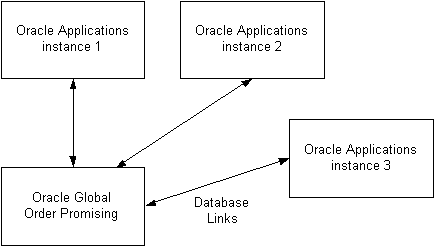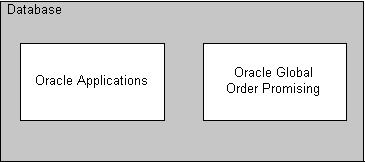Oracle Global Order Promising
Overview
Available-To-Promise (ATP), Oracle Global Order Promising (GOP) provides an internet-based, sophisticated, and fast order promising tool that provides accurate and reliable delivery promises. Oracle Global Order Promising is a comprehensive order promising solution that determines, based on the current and projected demands and supplies across a supply chain and on an extended supply chain, when a customer order can be fulfilled. This functionality includes distributed global order promising and multi-level supply chain Available-To-Promise (ATP), Capable-To-Promise (CTP), and Capable-To-Deliver (CTD) capability.
Oracle Global Order Promising allows you to consolidate supply and demand information from multiple transaction systems to provide a consolidated global picture of supply and demand. It is accessible from multiple order entry systems or other order capture systems, such as call centers or Web stores. It is fully integrated with all of Oracle's Order Management and customer relationship management applications for capturing orders.
It can be deployed either as a component of a complete eBusiness suite implementation or on a separate server. This flexibility allows you to support any combination of standalone order promising configurations. This also ensures high availability and unequaled scalability. You can provide an extremely accurate statement of availability to all customers in your global supply chain.
Oracle Global Order Promising addresses the following key business issues:
-
How can I promise the most accurate dates?
-
How quickly can I respond to a customer request?
-
How can I get availability information from anywhere?
Key Capabilities
Supply Chain ATP
Large global companies have many different manufacturing and distribution locations that can ship the same product to customers. In this environment with multiple supply locations, your customers or sales representatives must be able to easily and quickly identify which location has the appropriate product and select the best location. Oracle Global Order Promising determines the best location for you based on the product and order request date. Sourcing rules determine the acceptable choices, allowing you to maintain control over which orders get routed to which fulfillment locations.
Multi-Level Supply Chain ATP, CTP, and CTD
Oracle Global Order Promising calculates promise dates on the basis of both current on-hand supplies (ATP) and future demand versus supply. It checks for availability at multiple bills of material levels and at multiple supply chain locations, drilling down into resource and supplier capacities as necessary (CTP). Oracle Global Order Promising also considers intransit lead times in its calculations.
You can perform a multi-level component and resource availability check across your entire supply chain for the products requested. Using Oracle Global Order Promising, you control the organizations and suppliers to be included in the availability inquiry, and you control the number of levels in your supply chain bill to be considered in your check. At each level in the supply chain, you specify the key components and the bottleneck resources for which to check availability. The multi-level ATP functionality of Oracle Global Order Promising's considers transit lead time at each stage of your supply chain—from suppliers through internal facilities to customers, providing accurate and reliable delivery promises.
Allocated ATP
Allocated ATP allows you to allocate supply by sales channels or customers. You can protect your sales channels or customers from each other by ensuring that each one gets a specified portion of the supply. Depending on the situation, the allocation can be equal to the forecast of the sales channel or customer or to a portion of supply when supply is constrained.
ATP for Multi-Level Configurations
Oracle Global Order Promising supports Assemble-To-Order (ATO) environments. You designate optional items for an ATP check at any level of the configuration. This designation provides an accurate availability date for the end configuration. Oracle Global Order Promising integrates with Oracle Configurator to provide real-time availability information during product configuration.
Graphical Information for Your Planners
The result of a multi-level ATP is represented in a detailed pegging tree that shows you the component and resource availability at all levels across the supply chain. You can easily identify a material shortage or bottleneck resource. Further, you can look at the component or resource cumulative availability or at the supply and demand information for any time in the planning horizon.
Global Access
Oracle Global Order Promising is implemented as a PL/SQL package that is call-able from Web stores, order entry applications, such as Oracle Order Management, and from the menu structure of the Oracle Advanced Planning Suite.
Product Family ATP
In a customer-driven manufacturing environment, the exact demand of an end item may not always be possible to forecast. However, aggregate requirements may be possible to define and forecast at an aggregate level. Product Family ATP allows you to promise orders for a specific end item based on the supply statement at an aggregate (product family) level.
The member items within a product family usually require similar raw material and manufacturing process. Therefore, the end items can be interchanged within a product family. In such a scenario, if a demand is in the future and beyond the manufacturing lead time, you can use Combined Item-Product Family ATP to take advantage of aggregate supplies beyond a well-defined time period in the planning horizon.
Single Statement of Availability
You can consolidate data from multiple instances and different versions of Oracle Applications. Existing Oracle Application (Releases 10.7 and 11) customers need not upgrade other applications. Thus, multiple order entry systems can access a global statement of availability.
Scalability
Oracle Global Order Promising leverages the multi-threading capabilities of the Oracle database to provide support for multiple concurrent order promising requests.
Backward Compatibility
Using Oracle Global Order Promising, you consolidate availability information from multiple instances and different versions of Oracle applications. Oracle Global Order Promising is compatible with any supported version of Oracle Applications. Current Oracle customers implement Oracle Global Order Promising without upgrading their other Oracle applications.
Interface to Non-Oracle Applications
You can also include data from non-Oracle systems in your global statement of supply, demand, and availability. Interface tables allow you to collect data from non-Oracle applications. Non-Oracle application order entry or Web store systems communicate with Oracle Global Order Promising through application program interfaces (APIs).
Flexible Configuration
Oracle's Global Order Promising solution is flexible and configurable. You control the complexity of the availability inquiry, and you specify the list of potential sources to be considered in the availability check. You provide sourcing rules to specify the approved sources, and you assign these sourcing rules to products or customers. Sourcing rules allow you to control which products can be quoted to a customer from specific locations.
The system uses a flexible, hierarchical approach to assign sources. This hierarchical assignment allows you to employ sophisticated sourcing strategies with minimal data entry. Rules can be applied at several levels. For example, you can apply rules globally to entire organizations, to categories of products, or to individual stock-keeping units. More specific rules override more general rules, allowing you to apply default rules and maintain them on an exception basis, thus reducing the overhead necessary to maintain your global model.
24/7 ATP Support
Oracle Global Order Promising provides 24/7 ATP support that enables you to refer a plan for immediate delivery quotes for new orders even when the underlying supply chain plan is being refreshed. Automatic exceptions are generated for orders that are promised using the original plan but cannot be synchronized against the refreshed plan. You can also turn off ATP for a time period to speed up the switching process to the refreshed plan.
Oracle Global Order Promising also provides these flexibilities:
-
Check availability for an item or a set of items across bills and across organizations.
-
Control single level-level or multi-level availability check.
-
Check availability at a the product family level, allowing more rapid response in mixed-mode production environments.
-
Specify ship set or arrival set as constraints in the availability inquiry.
-
Specify infinite time fence to limit the time that availability is constrained.
-
Allow forward and backward consumption.
Integration with Other Oracle Applications
Oracle Global Order Promising is integrates with other Oracle applications, including:
Configuration
Oracle Global Order Promising supports the following configurations for implementation:
-
Standalone Planning Server Configuration: Oracle Global Order Promising sits on a different instance from other enterprise resource planning (ERP) applications.
-
Integrated Planning Server Configuration: Oracle Global Order Promising sits on the same instance as other enterprise resource planning applications.
Standalone Planning Server Configuration
In the Standalone Planning Server Configuration, supply and demand are pulled from the source instances to the Oracle Global Order Promising instance through database links.
The following figure shows the centralized order promising configuration:
Standalone Planning Server Configuration

Integrated Planning Server Configuration
With the Integrated Planning Server Configuration, Oracle Global Order Promising and its source data reside in the same database. No database link is required in this case. The two components can communicate through the planning object application program interfaces (APIs) and the interface tables defined in Oracle applications.
The following figure shows the decentralized order promising configuration:
Integrated Planning Server Configuration

Deployment
Oracle Global Order Promising can be deployed in the following two ways:
-
Without Oracle Advanced Supply Chain Planning (ASCP). Availability calculation is based on the collected supply and demand data from transactional systems. It is often referred to as ATP Based on Collected Data.
-
With Oracle ASCP. Availability calculation is based on an ASCP plan output. It is often referred to as ATP Based on Planning Output. The advantage of this deployment is the ability to do CTP and CTD checks, as well as the ability to use advanced order promising capabilities, such as Allocated ATP and End Item Substitution.
Note: When you deploy Oracle ASCP, you are not restricted in how you can deploy ATP. You can choose ATP Based on Collected Data or ATP Based on Planning Output. However, if you choose ATP Based on Collected Data, you can only use the capabilities that are enabled for that mode.
ATP Based on Collected Data
This deployment offers backwards compatibility to existing application users. Most of the 10.7 and R11 ATP capabilities are available in this deployment.
The major difference is the introduction of data collection. It is a process to pull transactional data into a repository for Oracle Global Order Promising.
For detailed setup instructions for this deployment method, seeATP Based on Collected Data Setup Flow provides detailed setup instructions for this deployment method.
See Chapter 3, ATP Based on Collected Data, for an explanation of the capabilities supported by this deployment method. The main capabilities are:
-
Basic ATP
-
Single-Level Supply Chain ATP
-
Product Family ATP
-
Configuration ATP
-
Demand Class ATP
ATP Based on Planning Output
The deployment of Oracle Advanced Supply Chain Planning provides a realistic supply picture that considers various constraints. Oracle Global Order Promising takes advantage of the output from an ASCP plan and promises delivery dates based on that. Additionally, a set of enhanced capabilities provide you with a better and more flexible order promising solution.
For detailed setup instructions for this deployment method, see ATP Based on Planning Output Setup Flow
See Chapters 4 and 5, ATP Based on Planning Output: Part I, and ATP Based on Planning Output: Part II, for an explanation of the capabilities supported by this deployment method. The main capabilities are:
-
Basic ATP
-
Multi-Level Supply Chain ATP
-
Product Family ATP
-
Configuration ATP
-
Allocated ATP
-
Demand Class ATP
-
End Item Substitution